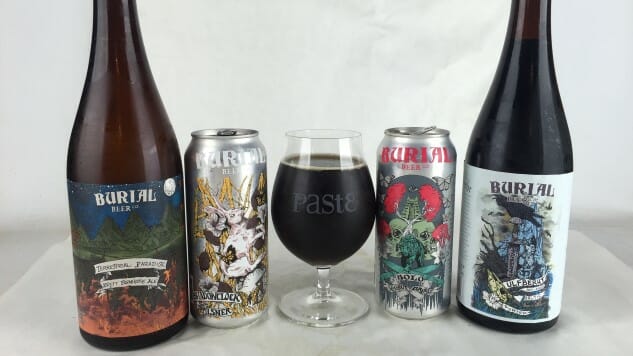Asheville’s Latest: Tasting Five Brews from Burial Beer Co.
Photo by Laura McKenzie
With 20-plus breweries in the immediate metro area of a city with merely 230,000 residents, it’s easy to see how Asheville carved itself out a niche as one of America’s most pro-craft beer bastions. In terms of great breweries per capita, it’s nigh-on unbeatable, from major regional breweries in the immediate area (New Belgium, Sierra Nevada, Highland) to critical darlings of modern American sours (Wicked Weed) to beloved local breweries with proud histories of their own (Asheville Brewing Co., Green Man, etc). It’s one of the best places in the country to go on a brewery crawl, considering that a dozen or more are all within walking distance of one another, ringing the attractive downtown area. And it’s a beer scene that never seems to stop growing and evolving.
As such, there always seems to be a new Asheville brewery that is trending, and in 2015 and beyond that has been Burial Beer Co. In all honesty, it has been fascinating for me as a craft beer fan to watch a groundswell of hype for Burial develop on the East Coast and the Southeast. In a city with so many breweries, and so many good ones, for one of them to figuratively surge ahead of the pack is quite difficult. Even odder is the fact that Burial has largely done so while working in classical beer styles, although with occasional twists. But it’s not like Burial is a burgeoning sour beer titan, or barrel-aging every other beer that passes through the brewhouse. If anything, they stand out for how balanced they are and how many disparate styles they tackle at any given time. Scroll through their history on Beer Advocate and you’ll see just how many releases there have been since 2013, and how varied they are: Saison, schwarzbier, dubbel, IPA, gruit beer, brown ale, tripel, stout, witbier, old ale, rye beer, biere de garde, etc, etc, etc. It’s as if the brewery takes its cues from the best of American, German and Belgian styles in equal measure.
Of course there are also the stand-outs, as it tends to be single beers that propel a brewery forward into the attention of beer geeks (and especially traders), rather than the merits of a well-balanced lineup. With Burial, the most prominent of those has likely been the brewery’s Skillet Donut Stout, a decadent coffee oatmeal stout (no actual donuts) that has become popular trade bait in the last few years. The brewery’s profile has correspondingly risen—it’s not unusual to now hear East Coast beer geeks of the more irritating variety say things such as “Eh, I don’t really drink Wicked Weed anymore; I’m more into Burial for Asheville.” So goes the tides of craft beer—as one wave rolls out, another inevitably must roll in.
Up until recently, my only chance to personally try Burial’s beers had been during a short stop at the brewery’s taproom while traveling to Asheville for a Wicked Weed festival. We were pleased, then, to learn a few months ago that their production and distribution are expanding … with Paste’s Georgian home as one of their first prospective additional markets.
In anticipation of the beer headed our way, we decided to put together the following tasting of five Burial beers: Shadowclock Pilsner, Bolo Coconut Brown, Ulfberht Baltic Porter, Terrestrial Paradise Saison and the imitable Skillet Donut Stout.
Shadowclock Pilsner
Burial’s year-round pilsner seems to draw its inspiration primarily from classic German variants, rather than the more edgy Czech pils. This isn’t to say the beer is lacking in hops—in fact, it’s quite hoppy, even among American craft pilsners—but an observation on the character of those hop aromatics and flavors. It’s very floral and “green” on the nose, with some herbal character as well, derived from what are clearly continental hop varietals. Not present, though, is the telltale spicy buzz of Saaz, which in my eye is almost always the heart and soul of what differentiates German from Czech pils.
Regardless, this is a characterful pilsner, and certainly not an afterthought meant to “keep the locals happy” on hot summer days. Biscuity, slightly bready malt is present in small quantities, with a balance that tilts slightly, but not excessively, in the direction of those grassy, floral hops. It’s a gentle but interesting everyday drinker for appreciators of European hops who have learned to enjoy the subtleties of lagers.
Bolo Coconut Brown
Dark ales with toasted coconut—brown ales, porters, stouts, etc—aren’t that difficult to come by these days, and to be perfectly honest, anytime I see “coconut” on a beer label I almost invariably walk away thinking “this is way too much coconut.” Surprisingly, though, that was not my ultimate impression of Bolo. It manages to evoke some of the richness of coconut confections without getting carried away.
On the nose, it reminds one of nothing so much as a chocolate and coconut macaron, which is presumably exactly what they were going for. You get cocoa on the palate, and—wait for it—nuttiness, in its toasted malt flavors. That’s “toasted” rather than caramelized for the most part, which makes a pleasant partner to the gentle coconut, which manages to be unmistakable without bringing a boatload of residual sugar along with it. That also makes for a fairly drinkable brown ale with all things considered; certainly moreso than many of the candy-like coconut beers on the market. This style isn’t the sort of thing I typically reach for, but Bolo executes it with considerably more tact than most, which you have to appreciate.
-

-

-

-

-

-

-

-

-

-

-

-

-

-

-

-

-

-

-

-

-

-

-

-

-

-

-

-

-

-

-

-

-

-

-

-

-

-

-

-









































